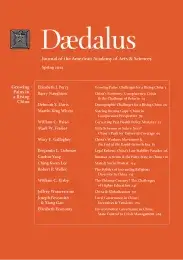Demographic Challenges for a Rising China
Looking into the near future, China faces immense demographic challenges. Prolonged sub-replacement fertility has created irreversible conditions for rapid aging of the population, and massive migration to cities has left many villages populated by elderly farmers with no adult children to support them. Soaring divorce rates and high levels of residential dislocation have eroded family stability. To a large extent, government policies created to accelerate economic growth inadvertently fostered these demographic challenges, and now the country is facing the negative consequences of interventions that previously spurred double-digit growth. Legacies of Confucian familism initially blunted pressures on families. Filial sons and daughters sent back remittances, parents cared for migrants' children and invested in their children's marriages, and families with four grandparents, two parents, and one child (4+2+1) pooled resources to continuously improve a family's material well-being. But now the demographic challenges have further intensified and the question arises: can the state adopt new policies that will allow the prototypical 4+2+1 families created by the one-child policy to thrive through 2030?
